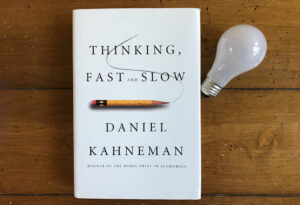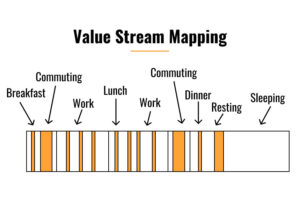Download this executive summary in PDF: The 7 Habits of Highly Effective People by Stephen R. Covey
PART ONE: PARADIGMS AND PRINCIPLES
Inside-Out
- Character Ethic: success and happiness require these principles, integrity, humility, fidelity, temperance, courage, justice, patience, industry, simplicity, and modesty.
- Personality Ethic: success depends on personality, skills, attitude, and techniques.
- There are two kinds of maps, realities, and values that guide our decisions, and they influence our perception of the world and our behavior.
- Principles are guidelines for human conduct that are proven to have enduring, permanent value.
- Inside-Out, start with self, with our character, motives, and paradigms.
The 7 Habits—An Overview
- Habit is the intersection of knowledge (what to do, why), skill (how to), and desire (want to).
- Maturity continuum: dependence (you take care of me), independence (I am responsible), interdependence (we cooperate).
- Effectiveness is the balance between the production of desired results and the production capability (goose and golden egg story).
- Three kinds of assets: physical, financial, and human.
- The assets are the production capabilities, protect and nurture them.
PART TWO: PRIVATE VICTORY
HABIT 1: Be Proactive
Principles of Personal Vision
- Self-awareness is the ability to think about your very thought process.
- People are conditioned by genetic determinism, psychic determinism, and environmental determinism.
- Between stimulus and response, man has the freedom to choose.
- Proactivity, our behavior is a function of our decisions based on values, not our conditions.
- Reactive people are affected by their social environment and the behaviors of others.
- Taking the initiative, recognizing our responsibility to make things happen.
- I have to vs I choose to.
- Love is a verb, not only a feeling. Show love by doing more.
- Proactive people focus their energy on the circle of influence, on things they can control.
- Reactive people spend their energy on the circle of concern, on circumstances they have no control over.
HABIT 2: Begin with the End in Mind
Principles of Personal Leadership
- Begin with the end in mind, how do you define success when you have already passed away.
- All things are created twice, you plan then you do, and you have a business plan before creating the business.
- Take charge of the first creation according to your principles.
- Management is doing things right; leadership is doing the right things.
- People have the conscience and imagination to write their scripts.
- Write a personal mission statement like the Constitution to be your compass when you have to make a decision.
- Security, guidance, wisdom, and power are the interdependent factors at the center of our life that define our life.
- Security: personal sense of worth, self-esteem, emotional anchorage.
- Guidance: principles, direction in life, standards.
- Wisdom: a perspective on life, judgment, discernment, comprehension.
- Power: capacity to act, strength to accomplish something
- There are different kinds of centers: spouse-centered, family-centered, money-centered, work-centered, possession-centered, pleasure-ventured, friend-ventured, enemy-centered, church-centered, self-centered, and principle-centered.
- As a principled-centered person, you perceive each experience and decision through the lens of your principles.
- The left brain is logical/verbal, the right brain is intuitive/creative.
- Write your personal mission statement with personal, positive, present tense, visual, and emotional sentences.
- Writing the mission statement must involve everyone if you want a commitment to the company.
HABIT 3: Put First Things First
Principles of Personal Management
- Independent will is the ability to make decisions and to act in accordance with them.
- Integrity is the capacity to walk the talk, to realize what our independent will planned to do.
- With discipline, you are the follower of your values. You subordinate your feelings and emotions to those values.
- The common denominator of success is being able to do even when you don’t want to.
- Time management: organize and execute around priorities.
- Effectiveness increases when you focus on important priorities (urgent and not urgent).
- Learn to say “no” to not important tasks.
- Coherence between your goals/missions and your important tasks.
- A balance between health, family, work, and personal development.
- Flexibility, you are the master of your important tasks.
- Your schedule is built around your values and priorities, it is not a prison.
- Delegate effectively with clear desired results, guidelines, resources, standards of performance, and consequences.
PART THREE: PUBLIC VICTORY
Paradigms of Interdependence
- Self-mastery is the foundation of good relationships with others.
- Building trust takes time, same as a bank account, making a deposit of trust builds up the reserve from which we can make withdrawals.
- When the trust is very low, the relationship deteriorates.
- Understand the person and what really matters to him.
- Little acts of kindness and courtesy, keeping commitments, clarifying expectations, showing personal integrity, and apologizing sincerely build up trust.
HABIT 4: Think Win/Win
Principles of Interpersonal Leadership
- Win/Win is the habit of interpersonal leadership that involves character, relationships, and agreements.
- The three traits of character are integrity, maturity (balance between courage to confront and consideration to empathically understand), and abundance mentality (there is plenty for everybody).
- Relationships are built on trust, credibility, and mutual learning. Even if we have a different view, we will find a solution beneficial for both parties.
- A clear agreement gives the standards and manages expectations between people.
- Set up a system that serves Win/Win relationships: “If you put good people in a bad system, you get bad results.”
HABIT 5: Seek First to Understand, Then to Be Understood
Principles of Empathic Communication
- Listen to understand the other person, not to reply.
- Diagnose before you prescribe.
- Four autobiographical responses: evaluate (agree/disagree), probe, advise, interpret with on our own experience.
- Good listening is rephrasing the content and reflecting the feeling.
- Ethos (personal credibility, integrity, competency), pathos (emotion), logos (logic). Effective communication is in this order.
HABIT 6: Synergize
Principles of Creative Cooperation
- Parties in synergetic communication gain more insight and learn more.
- Three levels of communication: defensive with low trust (Win/Lose or Lose/Lose), respectful but not creative (low Win/Win), and synergetic (Win/Win).
- You can exercise courage to be open and express your feelings to encourage others to do so.
- Value the difference in other people.
- Look for a third alternative for a Win/Win relationship.
PART FOUR: RENEWAL
HABIT 7: Sharpen the Saw
Principles of Balanced Self-Renewal
- Four dimensions of renewal: physical (exercise, nutrition, stress management), spiritual (clarification, commitment, study, meditation), mental (reading, visualizing, planning, writing), and social/emotional (service, empathy, synergy, intrinsic security).
- Balanced self-renewal is synergetic. Each dimension has a positive impact on the three others.
Inside-Out Again
Download this executive summary in PDF: The 7 Habits of Highly Effective People by Stephen R. Covey









